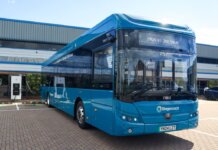The new governor of Colorado has signed an executive order outlining a number of initiatives and strategies aimed at supporting a transition to zero-emission vehicles (ZEVs).
“Our goal is to reach 100 percent renewable electricity by 2040 and embrace the green energy transition already underway economy-wide,” says Gov. Jared Polis, D-Colo.
The executive order includes the following directives:
- Create an interdepartmental transportation electrification workgroup, which will develop, coordinate, and implement state programs and strategies to support widespread transportation electrification across the state.
- The Colorado Department of Public Health and Environment shall develop a rule to establish a ZEV program and shall propose that rule to the Air Quality Control Commission no later than May.
- The Colorado Department of Public Health and Environment shall revise the state Beneficiary Mitigation Plan, which describes how the state will allocate nearly $70 million received in trust funds from the settlement of the federal Volkswagen emissions case. The revised plan will focus all remaining eligible investments on supporting the electrification of transportation, including transit buses, school buses and trucks.
- The Colorado Department of Transportation shall develop a department electric vehicle policy and plan designed to assure that state transportation investments and programs support widespread transportation electrification aligned with the articulated goals and strategies outlined by the above-mentioned workgroup.
“Today’s executive order will strengthen our economy and protect the wallets of consumers across the state,” Polis adds. “As we continue to move towards a cleaner electric grid, the public health and environmental benefits of widespread transportation electrification will only increase.”
The state offers a $5,000 tax credit for passenger EVs; partners with the private sector to build fast-charging stations along Colorado’s major highways; allocates a portion of Volkswagen settlement funds to support vehicle electrification; and has adopted a goal of 940,000 EVs on the road by 2030.
The state is also a signatory to the Regional Electric Vehicles for the West (REV West) memorandum of understanding, which creates a framework for collaboration in developing an Intermountain West Electric Corridor. In addition, the Colorado Air Quality Control Commission recently adopted Low Emission Vehicle (LEV) standards.
This latest announcement builds upon these past initiatives, according to Polis.
Mike Kruger, president and CEO of the Colorado Solar Energy Industries Association (COSEIA), is applauding the order and calling the announcement “exactly the type of leadership and vision we need for a clean energy future.”
“Electric vehicles are paramount to the realization of a statewide move to a cleaner transportation sector,” he says. “In addition to having lower operating costs, EVs can act as a mobile storage device to absorb clean, renewable energy during hours with plenty of available solar supply. COSEIA looks forward to working with the Polis administration to further his goals of 100 percent renewable electricity by 2040 through this and other efforts.”
Dan Gage, president of Natural Gas Vehicles for America (NGVAmerica), has issued a statement denouncing the order:
“In one quick stroke of a pen, Governor Polis appears to have chosen to appease EV corporate interests and political partisans at the expense of an entire generation of Colorado children. The governor is directing tens of millions of public dollars dedicated to mitigating the harmful impacts of the VW diesel emissions cheating scandal to purchase expensive, new and unproven EVs powered by a Colorado electric grid that is 54 percent fueled by…. (wait for it) … coal.
“These VW Environmental Mitigation Trust resources are provided so states can address the damaging clean air effects of the Volkswagen emissions cheating scandal by mitigating the most nitrogen oxide as soon as possible. That cannot happen by sequestering all VW funding for new EV purchases, which remains today an ultra-expensive and unproven heavy-duty vehicle technology.”
He adds, “Compared to expensive electric or fuel cell technologies still in development, investing in natural gas vehicles is the most cost-efficient solution… delivering more new vehicles and far more emission reductions than any other available alternative right here, right now, today.”
Photo: Office of Congressman Jared Polis [Public domain], via Wikimedia Commons






